WEDNESDAY, MAY 8, 2013
OffBook: Playing the Lead
by Jeff Sprague
So, you want to play the lead?
I have done nine main-stage productions (not including the immensely fun 24-hour production of “Months on End”…we should do something like that again, Artistic Team), I have directed a one-act and have been involved in several committees over the course of the last six years at CP. Not to mention, I’ve done six other shows locally, to include three musicals with big casts. Why am I giving you my resume?
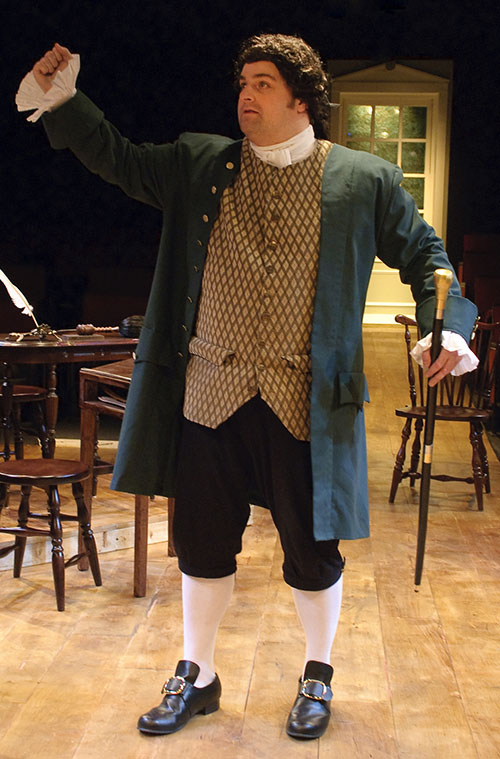 In all of those shows, I have never, up until my last production, had the coveted “last bow.” You know what I mean, theater people. Yes, that thing all of us actors want. The “woos” from the adoring public, the media attention, the underwear piling-up on stage…er, well, maybe not the last bit. Still, most performers hope to one day be lucky enough to have the chance to take that last bow. In “1776,” I got it. Was it everything I hoped it would be? Well, it didn’t suck, I can tell you that. In fact, I think that playing John Adams may have been the theatrical highlight of my “career” as an actor (the quotes are fully intended, as this is, and will always be, nothing more than a hobby for me). Still, for those of you young aspirants who have yet to have such an opportunity, I think there are some things one learns about community theater from playing the lead that are not readily apparent in other roles.
In all of those shows, I have never, up until my last production, had the coveted “last bow.” You know what I mean, theater people. Yes, that thing all of us actors want. The “woos” from the adoring public, the media attention, the underwear piling-up on stage…er, well, maybe not the last bit. Still, most performers hope to one day be lucky enough to have the chance to take that last bow. In “1776,” I got it. Was it everything I hoped it would be? Well, it didn’t suck, I can tell you that. In fact, I think that playing John Adams may have been the theatrical highlight of my “career” as an actor (the quotes are fully intended, as this is, and will always be, nothing more than a hobby for me). Still, for those of you young aspirants who have yet to have such an opportunity, I think there are some things one learns about community theater from playing the lead that are not readily apparent in other roles.
For one, to get that last bow, especially in a musical with a big cast and a lot of technical elements, you are going to be needed at EVERY rehearsal for over two months before the show opens. Also, while your castmates may only have to attend an hour or two on Saturday and Sunday, you can be assured that you will be there for the full eight hours (four each day). Between my day job and “1776,” I really haven’t had much time to myself since auditions in January. Because I loved playing John Adams, this didn’t bother me. A point to be made, though, is that if you are given the opportunity to lead a cast, you have to be willing to give all your free time to it for a period of months. You can’t have conflicts. You CAN complain from time to time, but if you do, you have to be willing to have people call you out on it. You volunteered for it, you knew what it involved, and you now have a responsibility to the rest of the cast and crew to know your stuff inside and out. This leads me to my next point: if you lead the cast, you have to be off-book before everybody else. More than likely, you’ll have lines that’ll cue most other actors. Their lines are just as important as yours, and if you aren’t on top of your lines (and songs, if applicable), it sets a poor example that can lead to grumblings. Moreover, if you are really off, it can lead to a loss of confidence about the show’s readiness from the director or other production staff, and the downstream, ripple-effects into the cast can be catastrophic.
You have to have thick skin. Critics are going to talk about you, and it might not always be good. Opinions are, to use the family-friendly version, like elbows; however, to put your full efforts into a show and then have it nitpicked can be a trying exercise in restraint. I have complained about critics “missing the point,” but I’ve now come to accept that you simply can’t please everyone (especially those with a forum for their opinions). You just have to give it your best.
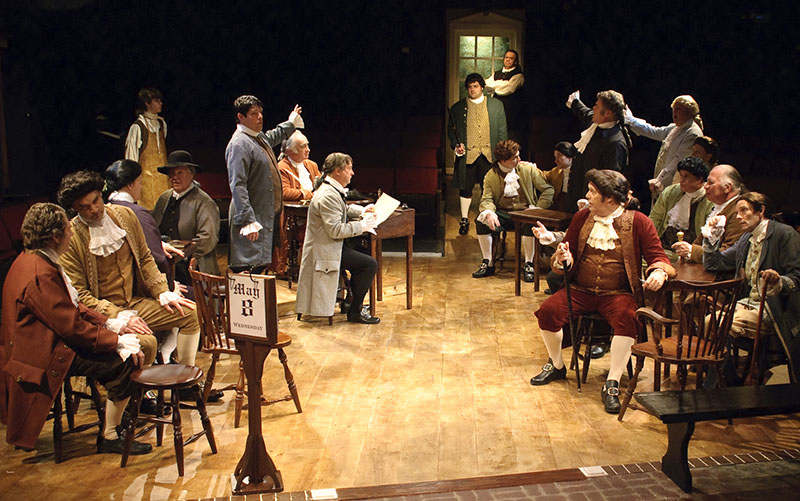 Lastly, and most importantly, you have to realize that IT IS NOT ABOUT YOU. “1776” had a cast of 27. Every one of the characters played an important role in telling the story, and while Adams was certainly a large force, he was one part among many. A leading actor must realize that he is still only a part of the production. He/she must take notes, must be courteous in the rehearsal process, and must NEVER, EVER give anyone else in the cast a note about anything. It is an honor to play the lead part in a show. It is an honor that is not a right. The director can replace anyone, and while your hard work should be rewarded by the audience’s reactions, you can’t ever forget that you are just one piece of the pie.
Lastly, and most importantly, you have to realize that IT IS NOT ABOUT YOU. “1776” had a cast of 27. Every one of the characters played an important role in telling the story, and while Adams was certainly a large force, he was one part among many. A leading actor must realize that he is still only a part of the production. He/she must take notes, must be courteous in the rehearsal process, and must NEVER, EVER give anyone else in the cast a note about anything. It is an honor to play the lead part in a show. It is an honor that is not a right. The director can replace anyone, and while your hard work should be rewarded by the audience’s reactions, you can’t ever forget that you are just one piece of the pie.
I’m nothing special as an actor. I’m very fortunate that Beth Terranova trusted me with John Adams. That I was cast was as much a factor of luck as it was ability, and I was not a “shoe-in” for the role by any stretch. There was another very talented actor up for the part, and I had to endure a post-audition interview with the director regarding my view of the character before she trusted me with Mr. Adams. I’m happy she did, but I don’t pretend, by any nature, that I was entitled to it. That’s something I really do want to get across. If you are a community- theater actor who has auditioned time and time again, and if you have not gotten the “last bow” yet (took me six years, and I’ve been told “no” for lead parts on several occasions), make a promise to yourself that when you do get it, you will honor it: the show, the director, and the rest of your cast. Know that the role is yours to lose, and that it is a privilege to stand where you stand. If you realize that, and if you put in the work, the “last bow” becomes that much more special. I’m going to paraphrase it, but there is a famous quote about being able to see from a great height because one stands on the shoulders of giants. Not that putting on a community theatre production is equivalent to curing malaria or something like that, but I know that being able to see the audience from the last bow in “1776” was only possible because of the 26 “giants” onstage with me (and countless other “giants” designing the tech aspects and producing the show). I shall always be grateful.
Next month, I promise to write about something a little less focused on my own journey in community theater, and more on what CP is up to. Everyone should check out “In the Next Room,” playing this month, and I hope to include interviews with some of the team involved in that production after I get a chance to see the play. As I write this, they are firmly entrenched in the rehearsal process and getting ready for opening. Break a leg!
~Jeff
MONDAY, APRIL 1, 2013
OffBook: John Adams
by Jeff Sprague
Greetings to all Off Book readers! Yes, all 12 of you. As you no doubt read Karen’s entry last month (in which she rightly celebrated the astoundingly awesome musical 1776) you know that she has moved on from being the regular blogger. Well, as the reader feedback to my guest post a few months back was so overwhelmingly supportive (seriously, I have a guy answering fan mail for me), I have been asked to take over the role of full-time pontificator on all things CP. I have accepted this challenge (for no other reason than the fact that I love my own opinions). Today, I’m going to talk a little bit about my current acting role at CP, and I hope to give a little insight into one of the coolest Founding Fathers to ever pick up a quill pen.
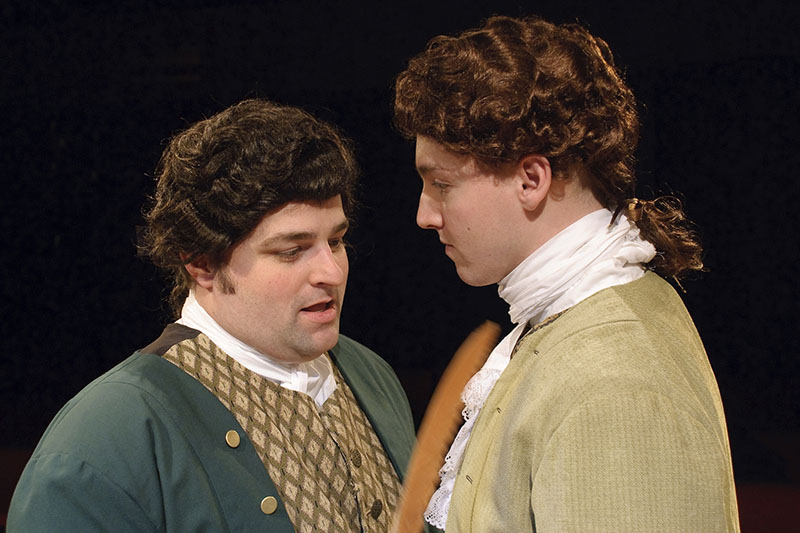 I am playing John Adams in 1776. He was an interesting cat in real life, and while he most likely didn’t burst into song whenever his political rivals annoyed him, his life has always been inspirational to me. He is known by many as the second President of the United States (and first Vice President). While his tenure as Chief Executive and his role in the writing of the Declaration of Independence bring him the most fame, I was always most fascinated by his part in the so-called “Boston Massacre” of 1770 (Google it, I’m on a limited word-count here). Mr. Adams, an attorney (like yours truly), defended the soldiers accused of murder during the riot, and the men were acquitted because of his efforts (some of the soldiers were convicted of lesser crimes). Adams was an ardent supporter of independence, and, as depicted in the musical, he certainly had no love for the Crown. The accused British troops were so virulently hated in Boston that it would have been easy to forgo formality and just ship them off directly to the gallows (due process be damned, do not pass “Go,” and do not collect $200). Indeed, such a result would probably have appeased the populace. The slight problem, of course, was that these accused men were not murderers. They were soldiers who were in an extremely confusing situation, and their safety was most definitely at risk by a violent mob tormenting and threatening them. The killings were, if not purely accidental, certainly justifiable from a defensive standpoint. This had to come out at trial. Mr. Adams defended the King’s men zealously because the right to an impartial trial for an accused person, with competent counsel, is fundamental. The Sixth Amendment to our Constitution can attest to that fact (a little something to think about the next time a jury summons pops into your mailbox). Adams put his own feelings on the British military presence in Boston aside to ensure that justice was done. You can’t argue with how cool that was, and I think about it every time I go onstage as his musical alter ego.
I am playing John Adams in 1776. He was an interesting cat in real life, and while he most likely didn’t burst into song whenever his political rivals annoyed him, his life has always been inspirational to me. He is known by many as the second President of the United States (and first Vice President). While his tenure as Chief Executive and his role in the writing of the Declaration of Independence bring him the most fame, I was always most fascinated by his part in the so-called “Boston Massacre” of 1770 (Google it, I’m on a limited word-count here). Mr. Adams, an attorney (like yours truly), defended the soldiers accused of murder during the riot, and the men were acquitted because of his efforts (some of the soldiers were convicted of lesser crimes). Adams was an ardent supporter of independence, and, as depicted in the musical, he certainly had no love for the Crown. The accused British troops were so virulently hated in Boston that it would have been easy to forgo formality and just ship them off directly to the gallows (due process be damned, do not pass “Go,” and do not collect $200). Indeed, such a result would probably have appeased the populace. The slight problem, of course, was that these accused men were not murderers. They were soldiers who were in an extremely confusing situation, and their safety was most definitely at risk by a violent mob tormenting and threatening them. The killings were, if not purely accidental, certainly justifiable from a defensive standpoint. This had to come out at trial. Mr. Adams defended the King’s men zealously because the right to an impartial trial for an accused person, with competent counsel, is fundamental. The Sixth Amendment to our Constitution can attest to that fact (a little something to think about the next time a jury summons pops into your mailbox). Adams put his own feelings on the British military presence in Boston aside to ensure that justice was done. You can’t argue with how cool that was, and I think about it every time I go onstage as his musical alter ego.
Anyway, I hope you get a chance to do a little Googling after seeing 1776. The show is, as mentioned, a musical, but it is a tribute to real men and real events. The founding of the United States of America was not a perfect situation, and the nation formed in the next 200 years is also not a perfect one. Nonetheless, this show lets us know about the inspiration to form our republic, and it never makes caricatures of those who risked everything to see a new nation grow and prosper. Given the partisan bickering that has dominated our political discourse over recent years, such a reminder is pretty refreshing.
Next month, we can look forward to In the Next Room (or The Vibrator Play). Yeah, I just giggled when I wrote “vibrator,” what of it? I was able to read this charming play during my membership on the Artistic Team last year, and I’m certain our audiences will be orgasmic in their reactions to this empowering and very funny story. More on that in next month’s edition.
If anyone has questions, comments, or opinions on topics for blog entries, send them to CP’s Marketing Team and I’m sure that they’ll be considered. A little interaction from the 12 of you who read this blog is welcomed!
~Jeff
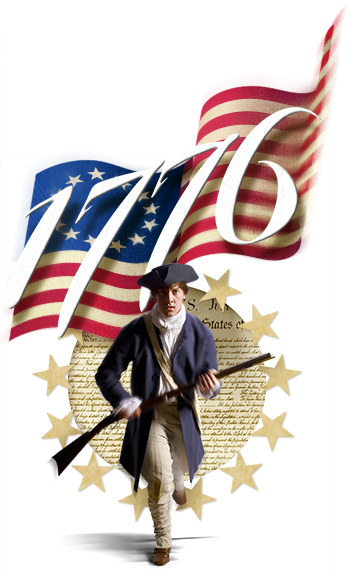 WEDNESDAY, MARCH 6, 2013
WEDNESDAY, MARCH 6, 2013
OffBook: 1776
by Karen Grim
TRYING’s run is over, and 1776 performances are about to begin. I enjoy the juxtaposition of these 2 shows. While they do both star male politicians, they are of course vastly different. Judge Biddle was “in the process of leaving this life.” In 1776 we get to see our forefathers (for some reason I’ve always loved that word) in the prime of their lives fighting for the right to live and die by their own rules and for the beliefs that they hold dear. They’re starting a revolution, and amazingly they do it through song. Oh didn’t you know? In 1776 life was like a musical, and when something important happened, by golly they sang about it! Ok kidding, I wish life were like that, although if you’re tone-deaf, I’d prefer you be a techie…is that mean? No, that’s honesty and besides, being a techie is, most of the time, vastly more important than being an actor, otherwise the curtain would never rise, the lights wouldn’t come up, and without them there wouldn’t be a show; it would be utter chaos! Oh, there I go rambling again…anyway I love a good musical, and that is precisely what you readers will be experiencing. Director Beth Terranova has assembled a Colonial Players All-Star cast. Maybe I’m biased because they’re my friends, but I happen to believe that I am only friends with the most talented individuals; that could be because the majority of my friends are theatre people, but who’s counting?
I think, in a place like Annapolis, this show will be particularly loved. Annapolis is a place steeped in history. Abraham Lincoln once strolled through those streets! I know this for a fact because I’ve gone on one of the Walking Tours. And when I stop and really think about where I am standing when I’m walking around State Circle, I’m floored. And speaking of Lincoln, once upon a time I decided to memorize The Gettysburg Address. I still remember it, and every time I recite it, I get filled with a sense of patriotism that, at times, I forget I have.
“Four score and seven years ago our fathers brought forth on this continent a new nation, conceived in liberty, and dedicated to the proposition that all men are created equal.”
That’s my favorite line and seeing it written there, I know that apart it’s meaningless letters, but when those letters are put together, they add up to make a sentence that has had such an astounding impact. Kind of like the United States. Separately, we are weak but together united as a nation, we’re a seemingly unstoppable force. Some of our forefathers knew this, and when you watch the actors bring 1776 to life you’ll be able to witness the seminal event in American history. 1776 opens in the summer of 1776, and Congress is ready to declare independence, if only our founding fathers can agree to it. John Adams, Benjamin Franklin and Thomas Jefferson alternately woo and rage at their fellow delegates as they wrestle with the details of the Declaration and what it will mean to their individual states – their “countries.” Much of the book of this musical is based on actual letters and notes from the convention, more historically accurate than you might think, and the humor, passion, and glorious music will make it an indelible history lesson that will fill your heart with pride and joy.
My only gripe with the show is Lincoln isn’t in it. Obviously, I know he wasn’t born yet so he literally he cannot be in it, but he’s my favorite president. Regardless of the lack of Lincoln in the show, I can’t wait to see it. If I were you, I’d get my tickets now…because all men are created equal, but not all of them are smart enough to get tickets ahead of time. ;-)
Special Note
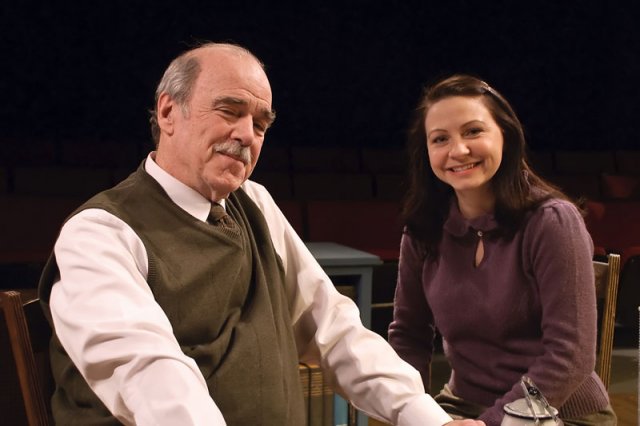 ALOHA dear readers! No, I am not writing this from a beautiful beach in Hawaii (I wish). I simply use that phrase because Aloha means Hello and Goodbye.
ALOHA dear readers! No, I am not writing this from a beautiful beach in Hawaii (I wish). I simply use that phrase because Aloha means Hello and Goodbye.
Yes, I’m sorry to say it is goodbye. I loved writing the blog this past year and would love to thank each and every one of you for taking the time to read my ramblings. Special shout-out to Laurel, my best friend and editor, for making my ramblings and run-on sentences easier to understand! I’ve learned a lot about myself this year and discovered things about my process that I could not have done if I weren’t forced to come up with a topic and then tell you all about it. It wasn’t easy for me. I was not gifted with a talent for words and phrasing the way some people are (here’s looking at you kid ;) ), and while I looked forward to the challenge, it’s definitely something I have struggled with. I’d like to think that I’ve gotten better and have grown as a writer and as a person, and who knows: maybe you’ll hear from me again as a guest writer, or possibly I’ll start a blog of my own. But until then, I hope you enjoyed my last blog and as always…I’ll see you at the theatre :-)
~Karen Grim
(still not famous :), but I’m working on it)
SATURDAY, FEBRUARY 2, 2013
OffBook: Trying
by Laurel Kenney
Hey folks, it’s Laurel, your friendly CP editor here. It’s been awhile since you last heard from me. Karen has been doing a fantastic job as the official CP blogger this past year, but since she’s one of the two actors in our production of “Trying” opening February 8, we figured it might be nice to give her a little break. Not too little, though, as I’ll be including an interview with her in this particular entry. I figure, as my best friend, she’s obligated. :-)
 I actually volunteered to write the blog this month because of how incredibly enamored I am of the play, “Trying” by Joanna McClelland Glass. I read it a few months ago and immediately fell in love with the elegance of the writing, the richness of the plot, and the endearing intelligence and wit of the characters. The story is based on the playwright’s real-life experience as Judge Francis Biddle’s secretary in the last year of his life. Karen Grim (who plays Sarah) and Michael Dunlop (who plays Judge Biddle) have a tough job to do, as they are the only two characters in the entire play. And they both remain onstage for the majority of the show. In addition, the play takes place entirely in one room. Given these circumstances, if you guessed that the show must be incredibly dialogue-heavy, you would be right. Most of the dialogue consists of the back and forth, ping-pong effect of two very quick, intelligent people not quite seeing eye-to-eye. Judge Biddle is too tired and too set in his ways to make the time to truly care about anything Sarah has to say. He wants her to fulfill the role of the secretary he has in his mind, which is a role Sarah is not equipped to play. She can tolerate his grouchiness, his lack of focus, and even sometimes his condescension, but instead of quitting when she is bullied as the others before her have done, she stands her ground. The story lies in the struggle between the two as they each try to put aside just enough of their own egos to tolerate, respect, understand and finally accept each other.
I actually volunteered to write the blog this month because of how incredibly enamored I am of the play, “Trying” by Joanna McClelland Glass. I read it a few months ago and immediately fell in love with the elegance of the writing, the richness of the plot, and the endearing intelligence and wit of the characters. The story is based on the playwright’s real-life experience as Judge Francis Biddle’s secretary in the last year of his life. Karen Grim (who plays Sarah) and Michael Dunlop (who plays Judge Biddle) have a tough job to do, as they are the only two characters in the entire play. And they both remain onstage for the majority of the show. In addition, the play takes place entirely in one room. Given these circumstances, if you guessed that the show must be incredibly dialogue-heavy, you would be right. Most of the dialogue consists of the back and forth, ping-pong effect of two very quick, intelligent people not quite seeing eye-to-eye. Judge Biddle is too tired and too set in his ways to make the time to truly care about anything Sarah has to say. He wants her to fulfill the role of the secretary he has in his mind, which is a role Sarah is not equipped to play. She can tolerate his grouchiness, his lack of focus, and even sometimes his condescension, but instead of quitting when she is bullied as the others before her have done, she stands her ground. The story lies in the struggle between the two as they each try to put aside just enough of their own egos to tolerate, respect, understand and finally accept each other.
This gets me thinking about New Year’s resolutions. I don’t typically make resolutions because I have enough self-awareness to know I will never stick to them. However, Karen’s New Year’s blog inspired me and had me pondering my own shortcomings. Something that I’m always working on is attempting more patience with other human beings – also compassion, understanding, and listening skills. For those of you who have never met me, you should know that I could possibly be the most impatient person in existence. Essentially, what it boils down to is that I want things done my way, all the time, and quickly (much like Judge Biddle). For the most part, if this doesn’t happen, it’s because another person prevented it from happening. This is never ok with me. And I realize that this particular expectation is completely unrealistic. People will never always do things my way because they want to do them their way. So, in addition to the reasons listed above, I felt particularly drawn to this play because of the theme: “trying”— trying to understand another human being whose personality, interests, background, and even age are so at odds with your own that the test of not only coexisting, but maintaining a successful relationship seems a nearly insurmountable challenge.
I asked Karen if I could interview her because I needed help understanding (from Sarah’s and Karen’s perspective) how it might be possible for two people who are so unalike to ultimately come to a mutual understanding.
 Laurel Kenney: We are talking about your character, “Sarah Schorr,” specifically her relationship with Judge Biddle among other things. One of the things that I wanted to talk about was the fact that at the root of this play are the communication issues between the two characters. Do you believe that their communication issues stem from one side or the other, or do you believe that they’re more balanced?
Laurel Kenney: We are talking about your character, “Sarah Schorr,” specifically her relationship with Judge Biddle among other things. One of the things that I wanted to talk about was the fact that at the root of this play are the communication issues between the two characters. Do you believe that their communication issues stem from one side or the other, or do you believe that they’re more balanced?
Karen Grim: I think, for the most part, they’re more balanced. And I think that stems from their differing backgrounds and the different places they are in their lives. He’s 81 and she’s only 25, and she’s basically just begun her journey. Also, it’s the ‘60s so she’s going through kind of a revolution; society is changing its views on a lot of different things: Civil Rights, Women’s Lib, etc, and she’s very much a liberal and a feminist, and he doesn’t know how to process that because he’s very old school. He’s from a different generation, and he expects women to act a certain way. And she expects that because he’s a Democrat, he’s going to act and react to her in a different way than he actually does. So, I do think it’s balanced. I think that they both have difficulty interacting with each other because of their differing backgrounds.
LK: How much of that do you think specifically has to do with age?
KG: I think it’s a pretty big factor. She is only 25, and she hasn’t experienced the world the way that he has. So, yes, I know this is very condescending, but he has learned so much more in his life than she has. They argue a lot in the beginning despite the fact that he doesn’t want to argue. He feels that there isn’t much point because no conversation that they’ll have is a conversation that likely he hasn’t already had. That’s hard for her because she feels like she has things to say that could be understandable or relatable to him, or maybe even influential. She feels that she’s different than all the other people, secretaries he’s talked to in the past, and she’s offended by the fact that he doesn’t care to have meaningful conversations with her because he doesn’t feel she can offer anything of value, which is not necessarily the case.
LK: Judge Biddle is always talking about how he can’t be bothered with “this,” he can’t be bothered with “that,” he’s in the last year of his life, etc. Do you think that his preoccupation with his own mortality, his impending death (according to him) impacts their communication?
KG: It does. He says that he doesn’t have the resources or the inclination/ faculty to be able to allow himself to care too much about her because he just doesn’t have the room in his head. He tries to care. He asks her about her life. He knows, I think, how her relationship with her husband is, and he knows about her past. But he still can’t allow himself to learn more about her than peripheral things because that’s all he can handle. It’s enough for him that he knows enough about her that by the end he can at least understand her. I think that’s enough for her too. She understands what he’s going through; she gets it.
LK: So, emotionally, he feels like he doesn’t have enough room to really take on another person in his life? Because he doesn’t have much time left anyway.
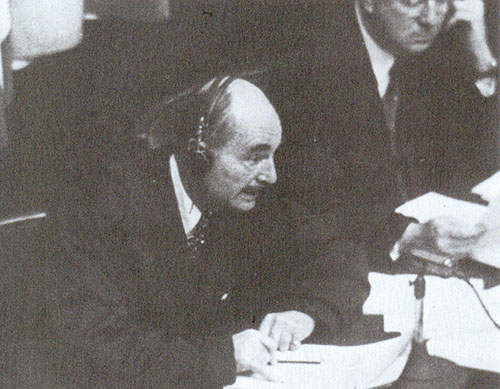 KG: He can’t take on another person. He feels like this is his final year. He says that in November upon their very first meeting: that this is the last year of his life. She probably thinks that he’s overreacting and is saying those things because he’s grumpy. But he’s not wrong; he says those things because they’re true. In the last year of his life, he spends a lot of his time reliving the past: memories, regrets, etc. Sarah senses and knows that he doesn’t have the room in his head and heart to be able to learn too much about her. He learns enough that she respects him and they develop a strong bond and a nice relationship. She doesn’t begrudge him not making a huge effort because she knows he just can’t handle it.
KG: He can’t take on another person. He feels like this is his final year. He says that in November upon their very first meeting: that this is the last year of his life. She probably thinks that he’s overreacting and is saying those things because he’s grumpy. But he’s not wrong; he says those things because they’re true. In the last year of his life, he spends a lot of his time reliving the past: memories, regrets, etc. Sarah senses and knows that he doesn’t have the room in his head and heart to be able to learn too much about her. He learns enough that she respects him and they develop a strong bond and a nice relationship. She doesn’t begrudge him not making a huge effort because she knows he just can’t handle it.
LK: How similar do you think you are to Sarah, and was it fairly simple for you to get into her headspace or did you find yourself struggling with it?
KG: Well, actually one of the hardest parts for me with the character was the Canadian accent; so if you come to the show, forgive me if I don’t sound very Canadian, eh? But in terms of our personalities and interests, I did struggle a bit. Sarah and I are different in some ways, and we’re the same in other ways. For instance, she’s from Saskatchewan, a western province in Canada. It’s prairie, wheat country, so she comes from a very kind of hard, living off the land, existence. Her entire life she’s been used to working very hard. I’m from a lower-middle class family in West Virginia. My mom was a single mother (my dad died when I was seven), so a lot of things happened to me in my childhood that allowed me to become a really strong, very independent person, and Sarah is very much like that. She’s hardworking, strong, she doesn’t back down from Judge Biddle when he puts her to the test, and she draws the line and doesn’t allow herself to be bullied, and I have been raised to be that exact same way. I think Sarah is a lot like my mother – extremely salt of the earth, very tough without being a downer. She’s optimistic, which is also something that I really am. She’s willing to try to make it work, because she made a promise, and that’s how I was raised as well.
The differences between the two of us were subtle, but they were strong enough that they were hard for me. First, there were the physical differences. I don’t necessarily stand up straight. When I’m talking to people, I don’t always look them in the eye. Sarah does, and she leads with her chin, she’s confident with a straight back, she’s not insecure, and she has overcome so much that she’s become such a formidable woman, and that’s not something I would really label myself as. Yes, I can be confident, but for the most part, I think I’m a bit softer, more demure, I guess, in comparison with Sarah. I’m not as battle-ready. Second, I felt like although I came to recognize that Sarah truly was a passionate person, her passions were very different from my own. They manifest themselves differently, and we express them differently. She is a writer at heart, and I’m not; she has a way with words, and a way of seeing the world around her that she uses in her writing that I don’t necessarily get because that’s not what I do. My passions are in theater, acting, and wondering what makes other people tick. I try to understand what it would be like to walk in someone else’s shoes. That’s what acting is about for me: trying to understand people better so I’m able to become different characters. That’s where my passion lies, and Sarah’s is just different. So when she would talk about something she’s really passionate about, I kind of floundered because that’s when you really see her. I was like, “Why would she say these things?” I talked to my director about it. There’s this moment when she describes being at home in Canada, and I just didn’t get it. Rehearsal after rehearsal, my director would say, “I need more from you, give me more, make it bigger.” At first I didn’t think that was how Sarah would feel, but it was how she would feel and react. She is a very passionate person when it comes to the beauty around her. And despite everything that’s happened to her in her life, she’s become this very optimistic, very open, sensitive being, and most of the time she pushes past that to do her work because she’s a very hardworking person, but when she has the time to be creative, and to talk about the things that make her passionate, she is so much more open. She gives more of herself in those instances. They’re fleeting, but they’re there. Yes, she is this very practical person, but there’s more to her than that.
LK: Do you feel (without giving away too many details) that ultimately Judge Biddle is able to understand Sarah as a person? Does he “try” enough to truly understand who she is?
KG: Not in the beginning. In the beginning, he’s actually trying to mold her into this person that he wants her to be. And she allows some of that to happen. She recognizes that she has to play along with a little bit of that. So, for the most part, I don’t think he tries to really understand her and attempt to do things her way until she lays down the law and says, “These are the things that you have to do if you want me to continue to work here,” and I think he realizes that especially in the last year of his life he just can’t even fathom having to hire someone else and having to go through the entire process again. Something that was discovered when we were researching Judge Biddle was that on his speed dial was something called “Kelly’s Girls” which was a temp service. He had to call them so often for secretaries because no one would stay for very long. So because he couldn’t process having to hire yet another person, he was willing to do things Sarah’s way and understand her better once she refused to back down, and once he realized that she was just as stubborn as he was, if not more so. He was able to overcome his own desires to make it work.
LK: And on the same topic, do you think that ultimately Sarah was able to understand Judge Biddle?
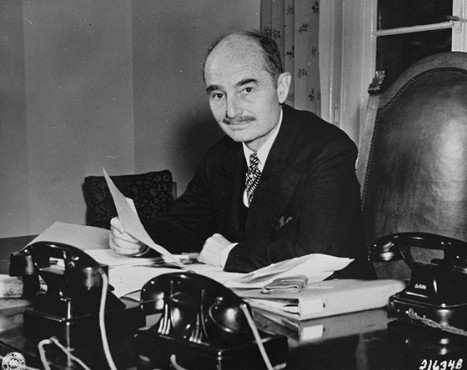 KG: I do think so. Katherine, Judge Biddle’s wife, gave Sarah a lot of background on him, and she [Sarah] also read his biography so she knew who he was going in. I don’t think she was as prepared for his grouchiness and his lapses in memory. I don’t think those were the things she prepared herself for, but I do think she understood what he was going through. Based on the play (I don’t know if this is true in Joanna McClelland Glass’s actual life), it says that Sarah helped her grandmother when she was sick and ailing so she learned a lot from that which allowed her to be in a place where she could help Judge Biddle manage his ailments and recognize the signs of deterioration so she could ultimately understand him.
KG: I do think so. Katherine, Judge Biddle’s wife, gave Sarah a lot of background on him, and she [Sarah] also read his biography so she knew who he was going in. I don’t think she was as prepared for his grouchiness and his lapses in memory. I don’t think those were the things she prepared herself for, but I do think she understood what he was going through. Based on the play (I don’t know if this is true in Joanna McClelland Glass’s actual life), it says that Sarah helped her grandmother when she was sick and ailing so she learned a lot from that which allowed her to be in a place where she could help Judge Biddle manage his ailments and recognize the signs of deterioration so she could ultimately understand him.
LK: Do you feel like you have ever had a Sarah/Judge Biddle situation in your life where you maybe had to take on someone who didn’t have any desire to understand who you were or even attempt to care about your needs?
KG: Yes, but not to the same extent. I have met a lot of people who I didn’t see eye to eye with politically. I have had to get on my soapbox a time or two to express or defend my beliefs. And I did work at a doctor’s office where I had elderly patients who weren’t very patient themselves. That was often difficult because despite not being able to completely understand what they were going through, I could still tell that they were hurting and all they wanted was help. So, in those situations, you have to allow them to say the things they need to say, but you have to stand your ground, and you can’t let them overrun you if they’re being too demanding. They’ll respect you more for it.
LK: How much, if at all, did your awareness of the fact that these characters are based on real people affect the approach to your development of Sarah?
KG: It definitely impacts how the roles are played because they are real people, and you can’t just take artistic liberties and end up making the people caricatures, but you have to realize that this is a play, and it’s not exactly historically accurate in some instances. I did do a little reading about Joanna McClelland Glass, but I didn’t let it change who Sarah was because Sarah and Joanna are different. If Joanna had wanted Sarah to be exactly like her, she would have made the character’s name Joanna rather than Sarah. I think because she [Ms. Glass] allowed herself to step away a little bit and create the character she wanted Sarah to be, it then allowed me to take some liberties and develop the character based on what’s written and not on Joanna McClelland Glass herself.
LK: Finally (based on your experience in this specific play), when two people are facing what appear to be insurmountable differences, if they try hard enough, do you think it’s possible for them to move past those differences and eventually understand each other?
KG: I do think so. It is definitely possible. I don’t think anything is insurmountable when it comes to trying to relate to someone else. I think you can always find a common denominator, a common factor, something relevant, even if it’s something small. I think it’s possible to meet people from various walks of life and respect one another enough to be able to come together to develop a relationship.
Thanks for taking the time to read, everyone, and please come out to see Karen and Michael Dunlop in this fantastic show directed by Darice Clewell. If, like me, you sometimes find yourself struggling with patience, understanding, or compassion towards other people in your life, you may find this story inspiring.
Until next time,
Laurel
THURSDAY, JANUARY 17, 2013
"Shipwrecked"
by Karen Grim
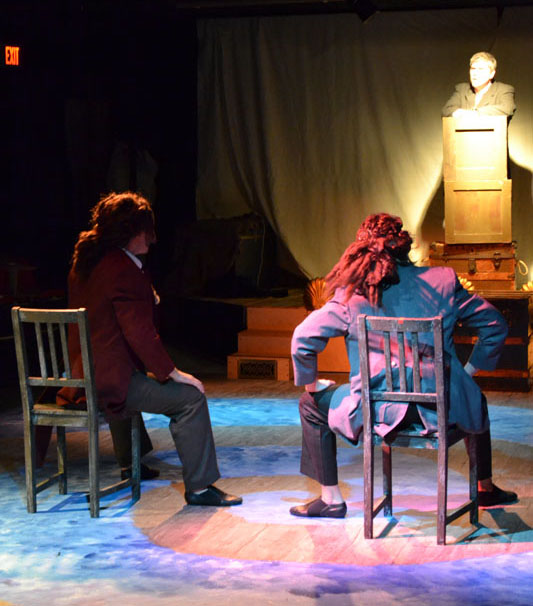 What better way to start the year than a trip to the theatre? With CP’s newest show you’re in for a real treat. We've taken out an entire section of seats to fully accommodate the spectacle that is Shipwrecked: the Amazing Adventures of Louis de Rougemont (as told by himself).
What better way to start the year than a trip to the theatre? With CP’s newest show you’re in for a real treat. We've taken out an entire section of seats to fully accommodate the spectacle that is Shipwrecked: the Amazing Adventures of Louis de Rougemont (as told by himself).
Shipwrecked, by Donald Margulies, is directed by Ron Giddings and stars John Halmi as “Louis de Rougemont” and Robert Tucker and Christina Enoch Kemmerer as… everyone else. I am NOT kidding; these two individuals play almost 100 characters. That is by no means an easy feat, and while you’ve heard from actors on how they prepare for one role, it’s much more compelling to hear from an actor who is playing multiple roles.
The following interviews are a crash course in how to successfully portray multiple characters. But be careful, these are trained actors so please… don’t try this at home :-)
Christina Enoch Kemmerer has performed in theatres around the Baltimore/Annapolis area and in New York where she earned her MFA in Theatre from Sarah Lawrence College. 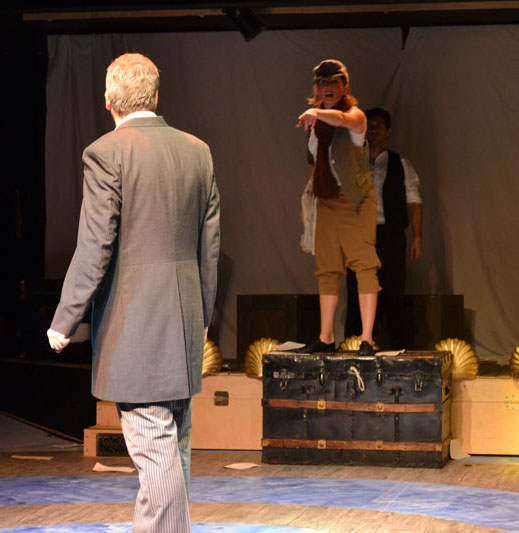 She has trained in physical theatre at the Stella Adler Studio and improvisation at Boom Chicago in Amsterdam. Christina has been a performer and instructor for the Baltimore Improv Group since 2005 and is a proud member of the troupe GUS, with which she has performed at improv festivals in Chicago, Philadelphia, DC, and Baltimore. When scripted, Christina was most recently seen onstage with Standing O Productions (co-founder) in Mr. Marmalade as Lucy, On the Twentieth Century (Lily Garland), and the U.S. premier of After the Dance (Helen). Other favorite roles include Little Sally in Urinetown (SLC), Claudius in Hamlet (The Shakespeare Naked), Kim MacAfee in Bye Bye Birdie (Liberty Showcase), Magenta in Rocky Horror (Spotlighters), and Vera Claythorne in And Then There Were None (Spotlighters) for which she was awarded “Outstanding Lead Actress in a Play” in the Best of Baltimore Community Theatre. Offstage, Christina spends her time teaching and directing as the Upper School Theatre Arts Director at the St. Paul’s School in Baltimore, MD.
She has trained in physical theatre at the Stella Adler Studio and improvisation at Boom Chicago in Amsterdam. Christina has been a performer and instructor for the Baltimore Improv Group since 2005 and is a proud member of the troupe GUS, with which she has performed at improv festivals in Chicago, Philadelphia, DC, and Baltimore. When scripted, Christina was most recently seen onstage with Standing O Productions (co-founder) in Mr. Marmalade as Lucy, On the Twentieth Century (Lily Garland), and the U.S. premier of After the Dance (Helen). Other favorite roles include Little Sally in Urinetown (SLC), Claudius in Hamlet (The Shakespeare Naked), Kim MacAfee in Bye Bye Birdie (Liberty Showcase), Magenta in Rocky Horror (Spotlighters), and Vera Claythorne in And Then There Were None (Spotlighters) for which she was awarded “Outstanding Lead Actress in a Play” in the Best of Baltimore Community Theatre. Offstage, Christina spends her time teaching and directing as the Upper School Theatre Arts Director at the St. Paul’s School in Baltimore, MD.
1. How many characters are you playing?
Between 20 and 30 I’d say.
2. What has been the hardest part about playing that many characters?
Remembering who I am playing next. Often I think I’m ready to go and have the right costume on, and when I realize I have a second to breathe, it’s usually because I’ve forgotten a character in between!
3. Which is your favorite character to play and why?
I would have to say Captain Jensen. It’s unusual for women to be able to play male roles so playing an old sea captain or “drunken old sea dog” as they call him, has been a lot of fun. He’s rough around the edges and a bit crazy. He is also on for a longer period of time so it gives me more to work with as opposed to the quick one-liner characters that we see in passing. I also love playing Albert’s mother – she’s rather a simple character on the page, but I’ve had fun bringing more personality to her.
4. If you have one, which is your least favorite character to play and why?
I really love them all. The hardest ones to master were the Experts, followed by the Reporters, Librarian, etc. simply because staging their transitions and getting the movement and timing precise [was difficult].
5. What advice would you give to someone taking on multiple roles?
Have fun! It is really easy to let the chaos of it all overwhelm you, but you just have to give in to it and jump in with two feet. In rehearsal, if I’m going to mess up, I’d rather come barreling into a scene as the wrong character if I’m fully IN character than having my focus be so much on the order of things. This, of course (we hope), will change in the coming weeks, as we’ll really start to run the show and get more comfortable with it.
6. Anything else you want to add?
This show has been a whirlwind – it’s like being the entire ensemble as well as the running crew all at the same time. We create the sound effects, execute the scene changes, portray the various characters, and have to remember our lines and cues – it can be crazy. It’s a very physical show with terrific writing and characterization. I’m excited to be a part of it.
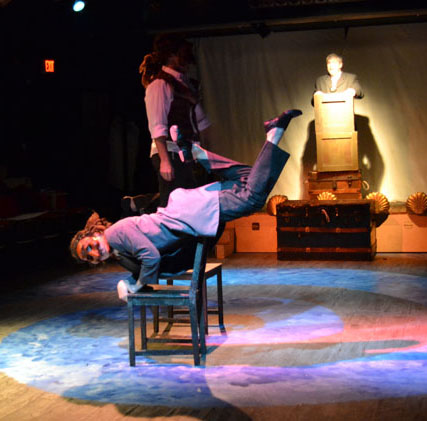
Robert Tucker holds a BFA in Music Theatre and a Masters in General (Arts) Education from The State University of New York at Buffalo. He also holds a Masters in Early Childhood Education from Towson University. Robert has performed in regional theaters in upstate New York and community theaters in Central Maryland. His love for physical theater usually landed him featured roles in college, although he has on occasion discovered that people happen to think he is handsome enough to play the ingénue. Among his favorite roles are The Courier in 1776 (Capitol Theater Summerstage), Che Guevara in Evita (Capitol Theater Summerstage), Hero in ...Forum (UB Dept. of theater and Dance). He has also originated the roles of Philopat in Hidden Trials (UB Dept. of Media Studies), and Leonardo in the Lauren Gunderson play Eye of the Beheld (The New Phoenix Theater). Locally, Robert has been seen as Freddie in Chess (Winters Lane), Fabrizio in Light in the Piazza (Theater Hopkins), Bill in Civil War (Tidewater), Robert in The Drowsey Chaperone (DCT), and Fred Barrett in Titanic (DCT). Robert works as an instructor attempting to bring authentic arts experiences to the youth of Harford County. He also has a great love for physical theater.
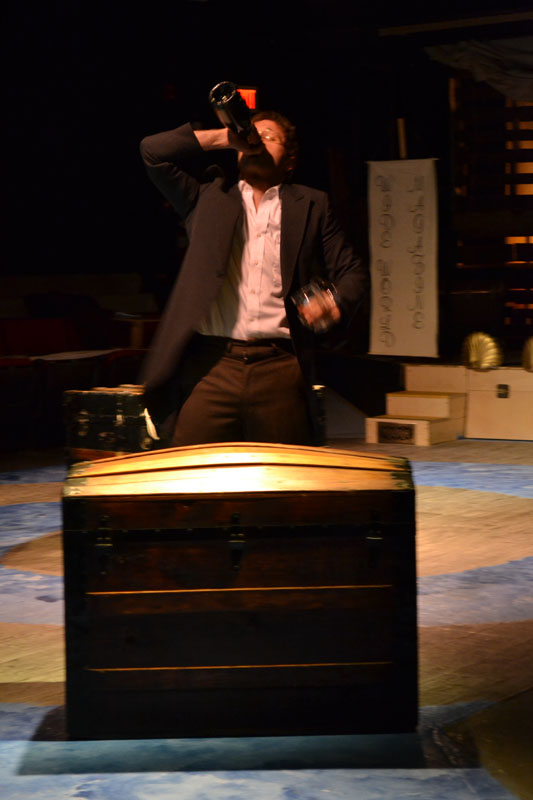 1. How many characters are you playing?
1. How many characters are you playing?
Fans of science fiction may not believe it, but I have counted, and the answer is 42! These include livestock, celestial bodies, and both members of an on-street argument.
2. What has been the hardest part about playing so many characters?
Finding different, appropriate attitudes was the most difficult part of it. I have a predisposition for making voices, so for many [of the characters] I began from there, making conscious decisions about mannerisms once I had that [the voices] established. Many of the different character traits derive from in-rehearsal improvisations which were pruned by Ron, Christina, Jon, and me. This was the most unique and positive rehearsal experience I have been a part of in a long time.
3. Which is your favorite character to play and why?
I love playing Fitzgerald, because he is the one character I play who absolutely is older than I am, so he needs to have challenges that I have never faced. Maybe his knee gives out, maybe he doesn't see all that well. I was afforded an opportunity to age myself in whatever way was believable. My other favorite characters are the turtle and wombat experts because their theatrical definition is 100 % surreal without giving away too much.
4. If you have one, which is your least favorite character to play and why?
I am not sure I have any moments when I dislike playing a character. I do play a dog who has to lay down in the smallest of spaces -- that can be a bit uncomfortable sometimes.
5. What advice would you give to someone taking on multiple roles?
Never cast off a line as unimportant. The only way the rapid-speed, multiple role effect can work is if the actor pours his whole self into each role, no matter how fleeting. Do not ignore the one-liners.
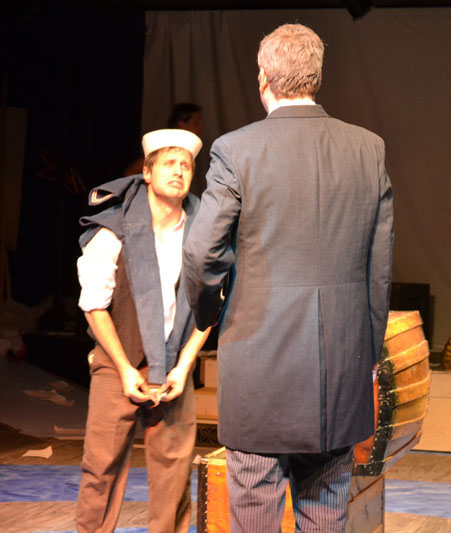
Christina and Rob are very talented, hard-working, and well-trained actors, but that doesn’t mean that you can’t try to take on as many roles as they have. With a little training and some confidence I believe that there’s a perfect role out there for everyone, if you’re willing to try. In fact, CP is currently offering three acting classes! Theatre Fundamentals and The Actor’s Instrument will be taught by consummate actor, dancer, vocalist, and teacher, Ken Skrzesz. Mr. Skrzesz’s long list of credentials include an MFA in Dance from University of North Carolina-Greensboro, multiple awards, resident artist positions, and a long list of performance credits. And if you’re lucky enough to get in to see Shipwrecked (because it's sold out!) the director, Ron Giddings, who is also a local actor and teacher, will be teaching the Physical Theatre Workshop. But register soon because class sizes are limited! Click here for more information on the workshops!
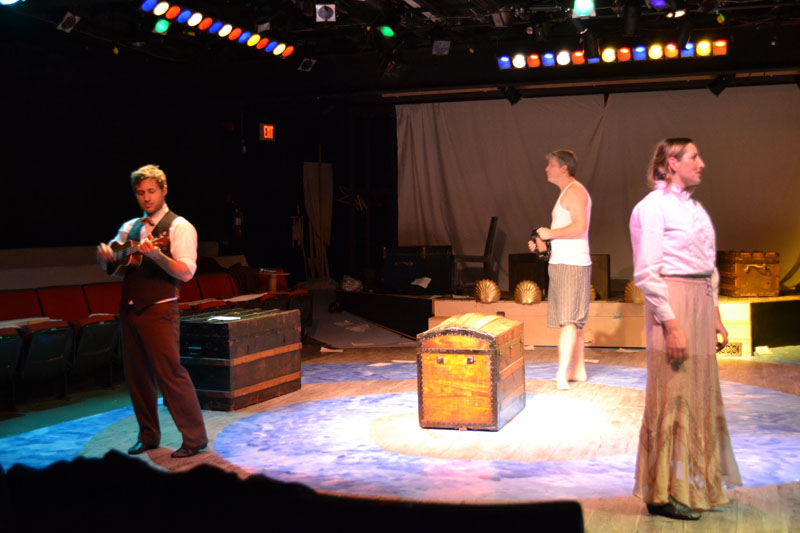
So what with these classes being added and all the pep talks and confidence I and other actors have given you readers, I should be seeing you at auditions very soon, right? Well, at least I hope so…
~Karen Grim
(still not famous :), but I’m working on it)
Don't miss out! Sign up for our email list by clicking here!
To contact The Colonial Players, please refer to the email directory on our Contact Us page or email This email address is being protected from spambots. You need JavaScript enabled to view it..
For questions about tickets and subscriptions, email This email address is being protected from spambots. You need JavaScript enabled to view it..
For website comments, questions, suggestions, as well as copyright and usage information, please contact This email address is being protected from spambots. You need JavaScript enabled to view it..
Copyright 2025 • The Colonial Players, Inc. • 108 East Street • Annapolis, MD 21401 • Phone: 410-268-7373

